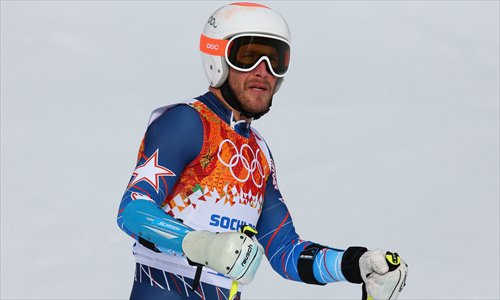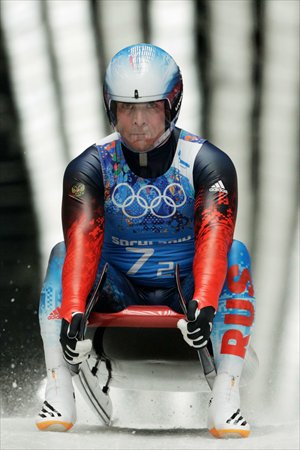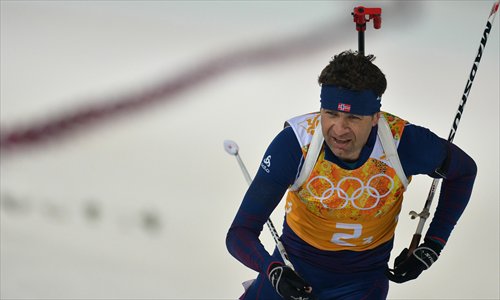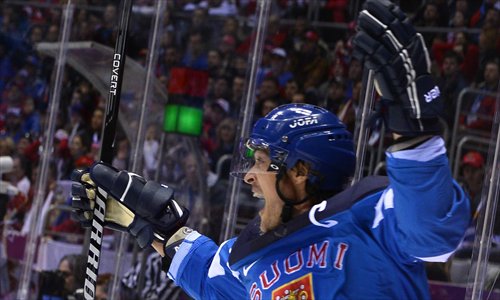HOME >> SPORTS
Oldies still golden in Sochi
Source:AFP Published: 2014-2-22 0:48:02

Skier Bode Miller of the US Photo: CFP

Luger Albert Demchenko of Russia Photo: CFP
They're the 30-somethings and even 40-somethings who refuse to bow out gracefully - the grizzled veterans of the Sochi Olympic Games who won't give in to gilded youth.
And they're not just here to admire the mountain scenery, winning medals of every color across a range of physically punishing disciplines against their younger rivals.
US skier Bode Miller, 36, shared bronze in the super giant slalom (super-G), a feat matched by 37-year-old Dutch speed skater Bob de Jong in the 10,000m while Russia's Albert Demchenko, 42, has two silvers in Sochi in the men's luge.
And then there's 40-year-old Norwegian biathlete Ole Einar Bjoerndalen, who ripped up the record books on Wednesday, becoming the most successful Winter Olympian in history with 13 medals, including eight golds.
When asked about joining alpine greats Hermann Maier and Kjetil Andre Aamodt as multiple medalists in super-G, Miller said, "It means I'm old."
Jamaican bobsleigh pilot Winston Watts, at 46, is three times the age of 15-year-old Russian ice dance princess Yulia Lipnitskaya and still full of bubbling enthusiasm, despite being nowhere near the podium in Sochi.
But even Watts, taking part in his fourth Olympic Games, feels the tap of Father Time on his shoulder and is ready to hand over to the next generation, describing himself as "old as dirt."
"Our main goal toward the next Olympic Games is to have young pilots, get younger athletes to portray their dream to go forward to the South Korean Olympic Games in 2018," said the Jamaican, who finished second from bottom in the men's two-man bobsleigh with brakeman Marvin Dixon.
"I'm still going to continue for maybe a year or two and just give it up to younger people so they can bring the legacy on."

Biathlete Ole Einar Bjoerndalen of Norway Photo: CFP
Insatiable medal machine
For Bjoerndalen, age appears to be just a number. Was it a factor in his fourth-placed finish in the men's 12.5 km pursuit on February 10?
Apparently not. "When I won (the men's sprint 10 km) gold two days ago my age wasn't a problem," he said.
Only US swimmer Michal Phelps and Soviet gymnasts Larissa Latynina and Nikolai Andrianov have won more medals at Summer or Winter Olympic Games.
A perfectionist who plans his training down to the last detail, Bjoerndalen takes a vacuum cleaner with him wherever he goes to avoid picking up infections.
His nicknames show his reputation for an unquenchable desire for victory - "the cannibal" who devours trophies or simply "the king."
"He's the biggest athlete of winter sports. I look up to him and he's really an athlete for young athletes to look up to," said Bjorn Daehlie, Norwegian cross country ski legend.
Bjoerndalen's achievement is all the more remarkable given that it has been in a tough endurance sport that mixes the physical test of cross country skiing with the precision of shooting.
Biathletes have to carefully control their heart rates to ensure they can shoot accurately in the range. One missed shot results in a penalty loop and a single miss can wreck a hopeful's race.
"Life is too short to give up. You always need to keep going on. I had some bad years with a lot of problems, but my motivation was never an issue. I was able to go on and do my training day after day," Bjoerndalen said.
Bjoerndalen has an amusingly quirky Nordic sense of humor but he would be the first to admit he is not the most colorful athlete in the world.
After his gold medal in the sprint event in Sochi, media joked that Bjoerndalen would celebrate his victory by working out on his spinning bike in his room.
"If that is true, it will stay a secret, because I have two competitors sitting here," he fired back deadpan.
Far smaller than most biathletes, Bjoerndalen excels due to his astonishing power-to-weight ratio and brilliantly fluent ski technique, which is a model for aspiring athletes.
He is expected to retire soon after the Sochi Games, but even his greatest rivals will recognize how much the sport loses when he goes.

Ice hockey player Teemu Selanne of Finland Photo: CFP
'Mentally we're the same age'
Finnish ice hockey veteran Teemu Selanne, 43, is back in Russia 25 years after he first competed in the country - still holding his own in the rough and tumble sport.
The NHL veteran made his Olympic debut in Albertville in 1992 and has now competed at six Olympic Games.
"I'm 43, and I play on the same line as guys who are 19 and 20-something," he said. "It's a good thing. Obviously they're just numbers. Mentally, I think we are the same age.
"Obviously I'm very proud that I've been able to play for so many years, and the passion for the game is the biggest reason I can still play. Of course it's not getting any easier at this age. But I'm still trying to play my best level and help the team."
"Knowing it's going to be my last Olympic Games, it's a good thing, you can really enjoy it. You see things differently, and just enjoy it," he added.
Suggesting the Finns are harboring the secret to eternal youth - at least on the ice - fellow 40-something and mother-of-three Hanna-Riikka Valila returned to the sport last year after a decade away and was reselected for Finland.
"I was a little reluctant to return at first. After all, I'm old enough to be the mother of many of my teammates," she said. "But I enjoy playing with these younger girls, they keep me feeling younger."
Posted in: Feature, Olympics